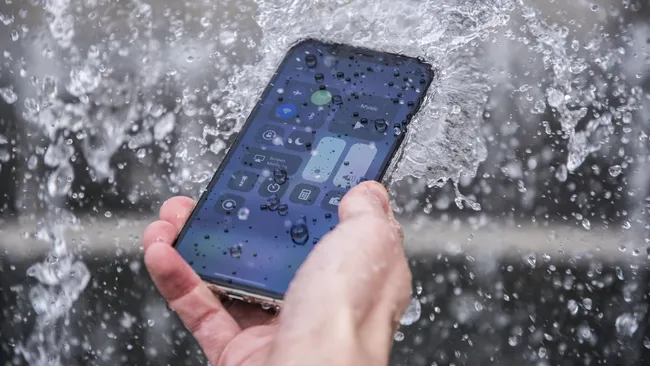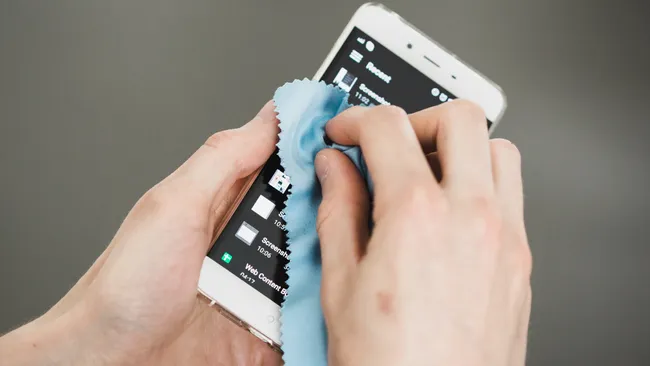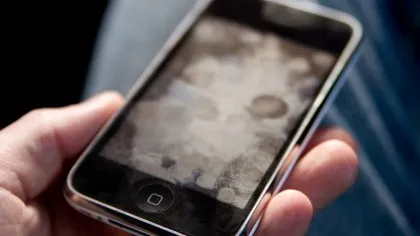Clean your smartphone properly: protect yourself from Covid-19
There are three common pieces of advice on minimizing the spread of the coronavirus issued by organizations such as the NHS and WHO. If you have to sneeze, hold a handkerchief in front of it or sneeze in the crook of your arm. Avoid contact with sick people and wash your hands - often and with soap.
Your cell phone complicates the last point. No matter how much you disinfect your hands, bacteria and viruses that are on your smartphone may get back on your hands as soon as you check WhatsApp or Instagram.
Few of us clean our phones regularly. We should have started much earlier!
Coronavirus: Apple is changing its official stance - you can now disinfect your iPhone
A 2011 study by the London School of Hygiene & Tropical Medicine found that every sixth phone analyzed showed traces of feces. And you want to make sure that your cell phone is free of nauseating bacteria like Staphylococcus aureus and Acinetobacter spp. as well as Covid-19.
A professor dealing with infectious diseases said to TechRadar:
"Good hygiene and disinfection of regularly touched objects such as door handles, surfaces and telephones is essential because it is very easy to transfer the virus to your clean hands by doing something touched someone who was near or who was carrying the virus. "
Smartphone Cleaning Methods
But what should we use to clean our phones?
You can use the same substances that you use to clean your hands, but some are better than others. The best advice at the moment is to dampen a lint-free cloth (made of microfiber), how to use it to clean glasses, add some soap, and wipe the phone and its case thoroughly.
Soap and water are a highly effective team
"Water itself does not inactivate or 'kill' viruses, but simply washes them away," says the professor with whom we spoke. "Soap is far superior because it contains fat-like substances. Viruses themselves consist of genetic material, proteins and fats. When soap interacts with viruses, the fat-like substances in soap compete with the virus lipids and cause the virus to be broken down. "
This is better than using the popular antibacterial hand gels.
"Alcohol gels are different because instead they contain a high concentration of alcohol, ethanol, which kills viruses," says the professor. "A bonus of the soap, however, is that you can cover a large surface when washing with water, so it is always preferable to use soap and water when possible. If not, then alcohol gel is good with a good technique."
However, be careful when washing your smartphone with an alcoholic solution. Wipes and gels with a very high alcohol concentration can damage the oil-repellent layer used to prevent obvious oily fingerprint stains on your phone's touchscreen.
Does your phone have a screen protector? Some higher-end models have their own oleophobic coating, but the inexpensive triple pack you bought on Amazon or eBay is probably little more than a thin plastic sheet with an adhesive side.
All smartphone manufacturers also recommend avoiding cleaning solutions that contain bleach or abrasives and refraining from using coarse cloths. These can damage the surface of the metal sides of a phone and cause micro-abrasion in the glass, making the surface dull. We are concerned with cleaning the phone, not ruining it.
UV virus zapping
If you want, you can also use "high-tech" to free your smartphone from viruses. Companies like PhoneSoap and Homedics manufacture UV disinfection devices for phones. These are reminiscent of small sunbeds and they bathe the cell phones in ultraviolet light.
Even Samsung stores * now offer free disinfection of your phone in some places using a similar method.
"Sunlight also inactivates the corona virus, hence the concept of UV-based cleaning kits," says the professor. "Just keep in mind that this approach slowly inactivates the virus over time, while soap and disinfectants do it almost immediately.
"There are many other products on the market that claim to kill the corona virus, but it is cheaper and easier to maintain good hygiene, wash your hands with soap, and use disinfectants."
This is good news for your wallet. UV cleaning devices for smartphones are much more expensive than a bar of soap.
Water versus smartphone
We also advise you, as always, to be careful with water near your phone.
The Samsung Galaxy S20, iPhone 11, Huawei Mate 30 Pro and many others have been tested for water resistance. These special models have IP68 protection, which means that they are designed to be immersed in fresh water at a depth of 1.5 m for 30 minutes.
Most of us, however, have dropped your smartphone at some point. And that may have affected the little rubber seals that keep the water out of the inside of the phone. Be sure to keep water away from the sockets on your phone. Liquid can also leak through damaged display glass from damaged screens and cause worse problems.
How long do viruses survive on a mobile phone? Long enough so that there is no excuse for careful hygiene, especially in the case of Covid-19.
"Some viruses can only survive outside the body for a very short time because they are so dependent on nutrition or certain physiological conditions (e.g. HIV), while others can survive longer," says the professor.
"Research into the coronavirus suggests that it remains viable for up to four hours on copper, up to 24 hours on cardboard, and up to 2-3 days on plastic and stainless steel. All of this is affected by the environment."
If the corona virus can survive for days on at least parts of your smartphone, now is a good time to start cleaning it regularly, as well as your hands. Are you worried about where to get the latest health advice? Visit, for example, the website of the Robert Koch Institute or the Federal Ministry of Health.
Now, what's the easiest way to clean your phone?
Prepare a bowl of hot (but not boiling) soapy water. Only use household soap, otherwise the coating on your cell phone could be damaged.
Now take your phone and be sure to remove the protective case if you're using one. Turn it off before you start cleaning.
Do not submerge your smartphone unless your phone is IP68 waterproof. (But even then, we recommend not submerging it completely.)
Take a cloth and dampen it with soapy water.
Now gently rub your phone with the cloth and make sure you reach every corner you can reach. If you have a case, do the same with it.
Make sure that the water does not get into the openings of the phone, e.g. the charging socket or the speaker grille, penetrates.
Then wipe the phone dry with a clean microfiber cloth.
Let your smartphone dry out completely before turning it on again. Repeat this method as many times as necessary.
There are three common pieces of advice on minimizing the spread of the coronavirus issued by organizations such as the NHS and WHO. If you have to sneeze, hold a handkerchief in front of it or sneeze in the crook of your arm. Avoid contact with sick people and wash your hands - often and with soap.
Your cell phone complicates the last point. No matter how much you disinfect your hands, bacteria and viruses that are on your smartphone may get back on your hands as soon as you check WhatsApp or Instagram.
Few of us clean our phones regularly. We should have started much earlier!
Coronavirus: Apple is changing its official stance - you can now disinfect your iPhone
A 2011 study by the London School of Hygiene & Tropical Medicine found that every sixth phone analyzed showed traces of feces. And you want to make sure that your cell phone is free of nauseating bacteria like Staphylococcus aureus and Acinetobacter spp. as well as Covid-19.
A professor dealing with infectious diseases said to TechRadar:
"Good hygiene and disinfection of regularly touched objects such as door handles, surfaces and telephones is essential because it is very easy to transfer the virus to your clean hands by doing something touched someone who was near or who was carrying the virus. "
Smartphone Cleaning Methods
But what should we use to clean our phones?
You can use the same substances that you use to clean your hands, but some are better than others. The best advice at the moment is to dampen a lint-free cloth (made of microfiber), how to use it to clean glasses, add some soap, and wipe the phone and its case thoroughly.
Soap and water are a highly effective team
"Water itself does not inactivate or 'kill' viruses, but simply washes them away," says the professor with whom we spoke. "Soap is far superior because it contains fat-like substances. Viruses themselves consist of genetic material, proteins and fats. When soap interacts with viruses, the fat-like substances in soap compete with the virus lipids and cause the virus to be broken down. "
This is better than using the popular antibacterial hand gels.
"Alcohol gels are different because instead they contain a high concentration of alcohol, ethanol, which kills viruses," says the professor. "A bonus of the soap, however, is that you can cover a large surface when washing with water, so it is always preferable to use soap and water when possible. If not, then alcohol gel is good with a good technique."
However, be careful when washing your smartphone with an alcoholic solution. Wipes and gels with a very high alcohol concentration can damage the oil-repellent layer used to prevent obvious oily fingerprint stains on your phone's touchscreen.
Does your phone have a screen protector? Some higher-end models have their own oleophobic coating, but the inexpensive triple pack you bought on Amazon or eBay is probably little more than a thin plastic sheet with an adhesive side.
All smartphone manufacturers also recommend avoiding cleaning solutions that contain bleach or abrasives and refraining from using coarse cloths. These can damage the surface of the metal sides of a phone and cause micro-abrasion in the glass, making the surface dull. We are concerned with cleaning the phone, not ruining it.
UV virus zapping
If you want, you can also use "high-tech" to free your smartphone from viruses. Companies like PhoneSoap and Homedics manufacture UV disinfection devices for phones. These are reminiscent of small sunbeds and they bathe the cell phones in ultraviolet light.
Even Samsung stores * now offer free disinfection of your phone in some places using a similar method.
"Sunlight also inactivates the corona virus, hence the concept of UV-based cleaning kits," says the professor. "Just keep in mind that this approach slowly inactivates the virus over time, while soap and disinfectants do it almost immediately.
"There are many other products on the market that claim to kill the corona virus, but it is cheaper and easier to maintain good hygiene, wash your hands with soap, and use disinfectants."
This is good news for your wallet. UV cleaning devices for smartphones are much more expensive than a bar of soap.
Water versus smartphone
We also advise you, as always, to be careful with water near your phone.
The Samsung Galaxy S20, iPhone 11, Huawei Mate 30 Pro and many others have been tested for water resistance. These special models have IP68 protection, which means that they are designed to be immersed in fresh water at a depth of 1.5 m for 30 minutes.
Most of us, however, have dropped your smartphone at some point. And that may have affected the little rubber seals that keep the water out of the inside of the phone. Be sure to keep water away from the sockets on your phone. Liquid can also leak through damaged display glass from damaged screens and cause worse problems.
How long do viruses survive on a mobile phone? Long enough so that there is no excuse for careful hygiene, especially in the case of Covid-19.
"Some viruses can only survive outside the body for a very short time because they are so dependent on nutrition or certain physiological conditions (e.g. HIV), while others can survive longer," says the professor.
"Research into the coronavirus suggests that it remains viable for up to four hours on copper, up to 24 hours on cardboard, and up to 2-3 days on plastic and stainless steel. All of this is affected by the environment."
If the corona virus can survive for days on at least parts of your smartphone, now is a good time to start cleaning it regularly, as well as your hands. Are you worried about where to get the latest health advice? Visit, for example, the website of the Robert Koch Institute or the Federal Ministry of Health.
Now, what's the easiest way to clean your phone?
Prepare a bowl of hot (but not boiling) soapy water. Only use household soap, otherwise the coating on your cell phone could be damaged.
Now take your phone and be sure to remove the protective case if you're using one. Turn it off before you start cleaning.
Do not submerge your smartphone unless your phone is IP68 waterproof. (But even then, we recommend not submerging it completely.)
Take a cloth and dampen it with soapy water.
Now gently rub your phone with the cloth and make sure you reach every corner you can reach. If you have a case, do the same with it.
Make sure that the water does not get into the openings of the phone, e.g. the charging socket or the speaker grille, penetrates.
Then wipe the phone dry with a clean microfiber cloth.
Let your smartphone dry out completely before turning it on again. Repeat this method as many times as necessary.








0 Comments:
Post a Comment